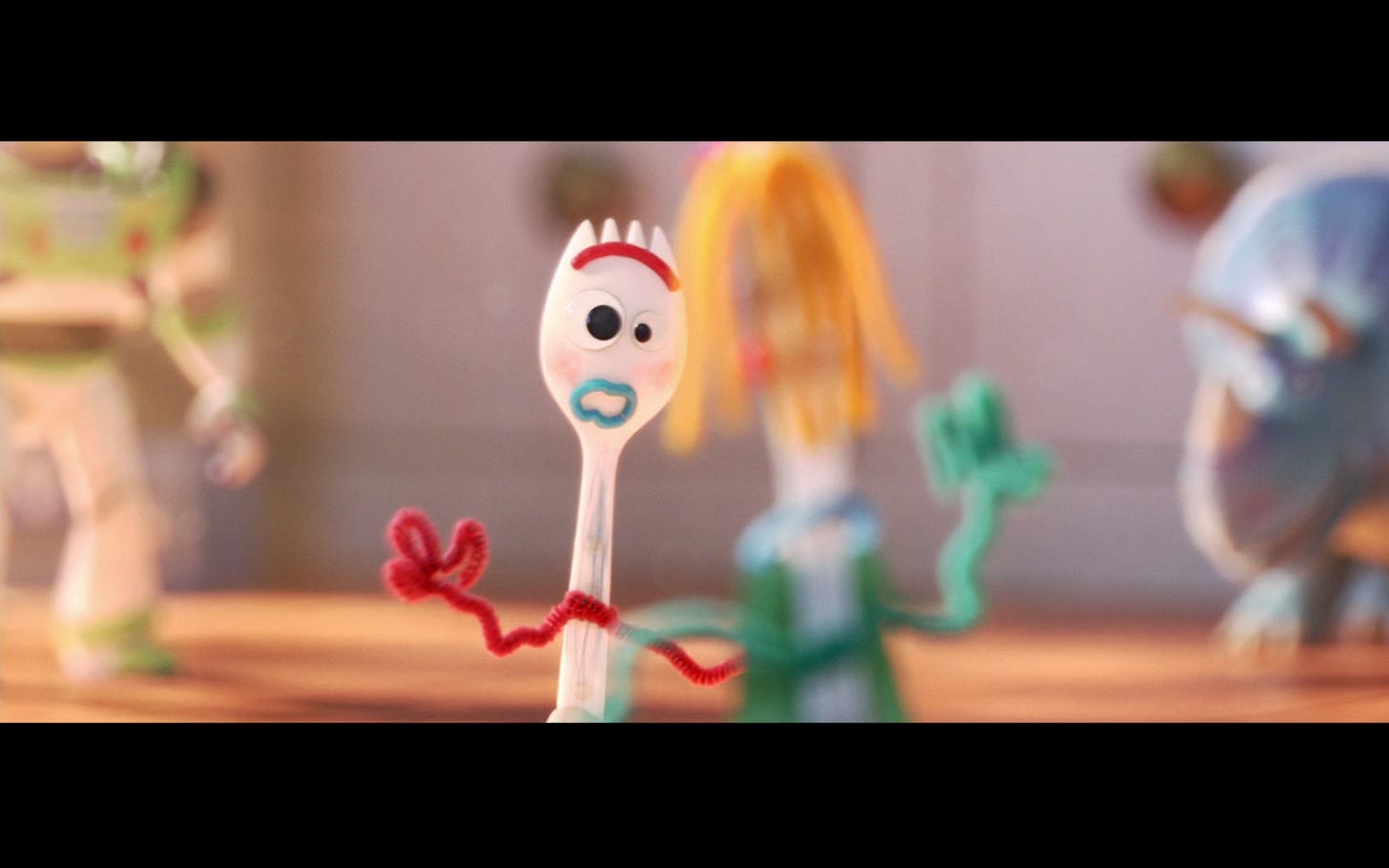An Investigation into the Nature of a Forky

what are we to make of forky, the star of toy story four, a year after his birth? the piece of plastic cutlery, transformed by the imagination of a small child and a handful of supplies at her disposal from a presumably consciousless environmentally unfriendly single-use spork into an all-too-aware sentient being, is the axle on which pixar’s toy story four pivots. when he emerges from the backpack, all he wants is to complete his journey by joining his compatriots in the trash. woody explains to him that he is a toy, introduces him to the other toys, and attempts reassurance but as soon as he gets the chance, forky is making a mad dash for the receptacle, standing on the edge of the bin only momentarily before, not unlike someone jumping from a building, he falls disappears from the screen. on woody’s watch, however, he simply cannot he allowed to die.
woody correctly recognizes that forky is important to the child and he, who begins the movie as a toy who has unfortunately joined a handful of dusty others in the hellish annals of the unplayed with, is not excited about the prospect of an early retirement and makes being forky’s chaperone his full-time job. there is then the film’s strongest stretch, a montage of forky’s attempts to end his existence on his terms constantly being thwarted by a determined woody. this culminates in forky seizing an opportunity to defenestrate made available by a distracted woody while the van they are in charges forward.
forky, confident in the separation he has created between himself and those who seek to control him, looks back to confidently explain: “i am not a toy! i’m a spork. i was made for soup, salad, maybe chili and then the trash.” as he jumps out the window he laughs and shouts: '“i am litter! freedom!"

of course, forky cannot truly be free. woody follows him out the window. he find forky, they walk, they talk, and forky is made to understand his new position in the world. when the film ends jessie emerges from the child’s backpack, just as woody did, and announces, just as woodie did, that the child made a new friend at school. this time, a plastic knife appears. forky, starry eyed, approaches. “trash?” the knife asks. “no, no,” forky replies. “toy, i am a…we are all toys. unique, beautiful toys.”

the question one must ask, then, is what to make of the journey of the humble spork. it is, in a sense, the inverse of buzz lightyear’s journey. the latter begins the now-four film saga all arrogance and bluster, believing himself to be a genuine space ranger. the understanding that he gains over the course of the film is an acclimation to reality. buzz lightyear, fundamentally, is not an actual space ranger. forky, on the other hand, begins the film not only acclimated to his reality but enthusiastic about it. at first blush, it is clear that the unbearable responsibility of being alive and having thoughts terrifies him but one simply cannot dismiss the genuine contentedness he feels lying in the trash, something small and discarded covering him like a blanket. woody repeatedly ejects him from the bin against his will. when he finds a way to exit the van, he’s thrilled.
it cannot be said, either, forky believes himself to be trash because he has a low opinion of himself, a warped and negative self-esteem. he declares it proudly and defiantly and with none of the connotations being trash carries for the toys. they emphatically assure him that he is a toy, misunderstanding the nature of the issue which lies, perhaps, in their perspective rather than his.
he ends the film, as previously noted, replaying his initial conversation with the group in the role of the chorus. you, he says, are not trash. you are a toy. in this, the writers, or maybe forky himself, tragically misunderstand the nature of the spork. the question need not be either trash or toy. he can be—nay, must be—both.


